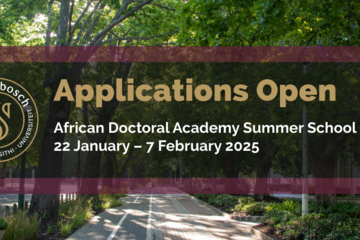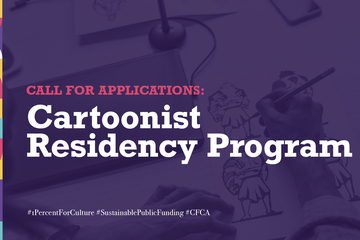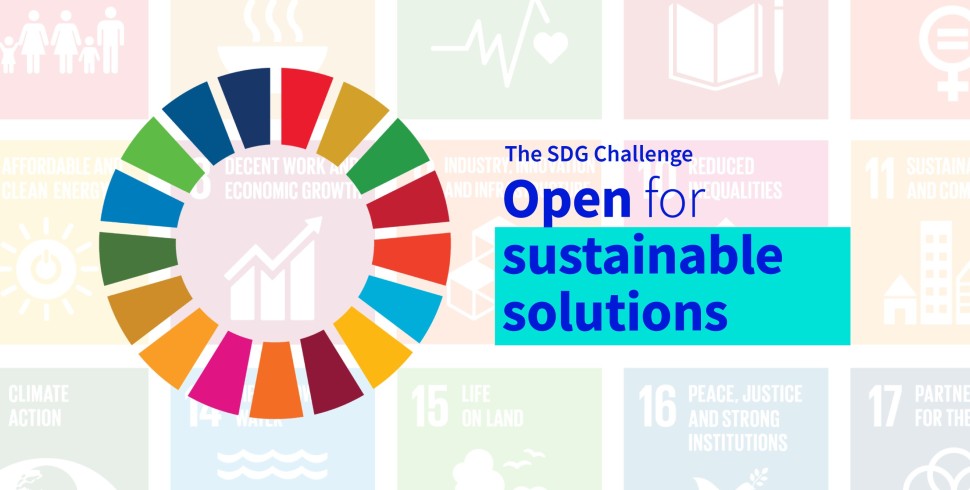Browse
Youth Empowerment
Call for Applications: African Doctoral Academy 2025 Hybrid Summer School
The African Doctoral Academy (ADA) is excited to announce that it will be hosting its annual flagship ADA Summer School from 22 January to 7 February 2025.The Doctoral Summer School programme will run over two and a half weeks, offering a selection of courses both in-person at the Stellenbosch Institute for Advanced Study (STIAS) and online.Read more:https://www.sun.ac.za/english/SUInternational/ADA/apply/apply-now
By:
Baboki Gaolaolwe-Major
Thursday, Nov 14, 2024
YOUTH EMPOWERMENT
+1

Leave a comment
Grants to celebrate the contribution of African Food to American Cuisine (Uganda)
The U.S. Embassy in Uganda is inviting applications for its culinary diplomacy program, “Celebrating the Contribution of African Food to American Cuisine,” in honor of Black History Month 2025.
💰 Grant Size: $10,000 - $100,000📍 Eligible Country: Uganda
This program seeks innovative projects that celebrate the rich influence of African cuisine on American food culture. Grants will be awarded to projects in:
🌱 Agriculture, Food & Nutrition
🎨 Arts & Culture
🍽 Hotels, Restaurants, and Hospitality
📈 Economic Development
🛠 Career Development
💡 Innovation
For more information, visit https://grants.gov/search-results-detail/356842
Premium Link: https://grants.fundsforngospremium.com/opportunity/op/celebrating-the-contribution-of-african-food-to-american-cuisine-uganda
By:
Baboki Gaolaolwe-Major
Wednesday, Oct 30, 2024
CULTURE AND SOCIETY
+2
No Preview Available
Leave a comment
Call for Applications: Cartoonist Residency Program
Are you a talented young cartoonist passionate about cultural advocacy and artistic collaboration? Apply now for the Cartoonist Residency Program — an empowering opportunity to support young African cartoonists through virtual and in-person learning, creative exchange, and cultural advocacy.Click here for more information and to apply: https://cfcafrica.org/call-for-applications-cartoonist-residency-program/
By:
Baboki Gaolaolwe-Major
Tuesday, Oct 29, 2024
CULTURE AND SOCIETY
+1

Leave a comment
IRELAND: SFI Sustainable Development Challenge (Over €1,000,000 Grant) 2025
Grant size: 1 million Euros
Donor: The Science Foundation Ireland
The SDG Challenge seeks to support diverse, transdisciplinary teams to develop transformative, sustainable solutions that will contribute to addressing development challenges under the UN SDGs in countries where Irish Aid works.
SFI and Irish Aid are seeking solutions that contribute to SDG 2: Zero Hunger, “End hunger, achieve food security and improved nutrition and promote sustainable agriculture”.
The SDG Challenge supports highly motivated, transdisciplinary teams developing transformative, sustainable solutions for UN SDGs in Irish Aid’s partner countries. Furthermore, interested applicants should take note of the following criteria:
Teams must be transdisciplinary and focused on developing sustainable solutions for UN SDGs in Irish Aid’s partner countries.
Teams should combine technical and non-technical skills and represent collaborative partnerships between researchers in Ireland and the partner country.
Expertise in a STEM research area is necessary ,along with knowledge or experience in complementary fields like international development, economics, or behavioral science.
Two academic researchers must be in the core team, with at least one from a relevant STEM discipline.
Funding should reflect the contributions of all team members.
https://www.afterschoolafrica.com/87048/science-foundation-ireland-sfi-2024-sustainable-development-challenge-over-e1000000-grant/
By:
Tony Milanzi
Tuesday, Aug 27, 2024
AGRI-FOOD SYSTEMS
+5

No Preview Available
Leave a comment
The Mastercard Foundation Fund for Resilience and Prosperity Agribusiness Challenge Fund
Grant size: $500,000 - $2,500,000
Donor: Mastercard Foundation
The Agribusiness Challenge Fund will provide SMEs with innovative and commercially viable agribusinesses across 20 countries in Sub-Saharan Africa the opportunity to receive support to upscale their businesses in a bid to create sustainable employment opportunities for young people, with particular focus on young women.
Selected SMEs will receive support from the Fund, including grants ranging from US$ 500,000 to US$ 2,500,000, disbursed over a 3-year period, based on the applicants’ development stage, scalability and business model, in accordance with agreed periodic milestone targets. The funding structure will be determined on a case-by-case basis after evaluating proposals and organizations. Additional support to successful applicants will include tailored technical assistance in alignment with FRP objectives over the 3-year period.
https://mastercardfdn.org/all/the-mastercard-foundation-fund-for-resilience-and-prosperity-launches-agribusiness-challenge-fund/
By:
Tony Milanzi
Tuesday, Aug 27, 2024
AGRI-FOOD SYSTEMS
+2
No Preview Available
Leave a comment
AREF Research Development Fellowship Programme (Africa)
Deadline: 4th October 2024
Grant size: Fellowship
Donor: AREF Research Development
The Africa Research Excellence Fund is pleased to launch the call for the 2024/25 AREF Research Development Fellowship Programme.
Programme Overview
Aim. To support researchers in Africa who are emerging leaders and working on important challenges for human health, to develop their skills as a researcher.
What we offer. A three to nine-month placement at a leading research institution in the UK, Europe or Africa, with additional support at your home institution before and after the placement. Up to £47,000 available
Who is eligible? Early career researchers. These are research active post-doctoral scientists and clinicians with higher qualifications who are nationals of and employed in Africa (see detailed eligibility criteria).
How to apply. Read the guidance documents carefully before developing your proposal and starting your application. Complete the application form via the portal at https://programmes.aref-africa.org.uk/
https://africaresearchexcellencefund.org.uk/funding-calls/open-funding-research-development-fellowship-2024-25/
By:
Tony Milanzi
Tuesday, Aug 27, 2024
CULTURE AND SOCIETY
+4
No Preview Available
Leave a comment
Postdoctoral Visiting Fellowships to promote International Research
Deadline: 1st October 2024
Grant Size: Not available
Donor: Kellog Foundation
While at the Kellogg Institute, postdoctoral fellows interact with leading scholars one-to-one and through the Institute’s seminars and lectures, international conferences, roundtable discussions on world affairs, and cultural events. The facilities at the Hesburgh Center are ideal for scholarly research. Fellows have spacious offices, on-site information technology support, and full access to library services, as well as other campus facilities.
We invite applications from scholars who conduct international research on our themes of global democracy and/or human development. Applicants may come from any country and must have recently earned a PhD within the last five years.Most successful applicants will work in a social science discipline or in history. Advanced ABD graduate students may apply, but awards are contingent on their having completed the PhD before June 30 of the starting fellowship year.
https://kellogg.nd.edu/opportunities/visiting-researchers/about-our-postdoctoral-visiting-fellowships#tab-3426
By:
Tony Milanzi
Tuesday, Aug 27, 2024
YOUTH EMPOWERMENT
No Preview Available
Leave a comment
Hello everyone, I am joining the Directorate of Youth Friendly Resource Centre, University of Nigeria. I am interested in countering Youth poverty, especially in Africa
By:
Professor Christian Ezeibe
Saturday, Aug 17, 2024
CULTURE AND SOCIETY
+1
Leave a comment
Hello, joining from Nairobi, Kenya
By:
Paul Katuse
Friday, Aug 16, 2024
YOUTH EMPOWERMENT
+1
Leave a comment
Research-Practice Partnership Grants Program
Grant Size: $100,000 to $500,000
Donor: Spencer Foundation
The Spencer Foundation is pleased to announce the Research-Practice Partnership Grants Program to support education research projects that engage in collaborative and participatory partnerships. They view partnerships as an important approach to knowledge generation and the improvement of education, broadly construed. Rigorous partnership work is intentionally organized to engage diverse forms of expertise and perspectives, across practitioners, scholars, and organizations, as well as disciplines and methods, in knowledge generation around pressing problems of practice and/or policy. This grant program is open to existing partnerships between researchers and a broad array of practitioners. For example, practitioners might work in school districts, county offices of education, state educational organizations, universities, community-based organizations, and other social sectors that significantly impact learners’ lives.
https://www.spencer.org/grant_types/research-practice-partnerships
By:
Tony Milanzi
Friday, Aug 16, 2024
AGRI-FOOD SYSTEMS
+4
No Preview Available
Leave a comment
Trash to Treasure Program: Empowering Women to Reduce, Reuse and Recycle Waste (Botswana)
Grant Size: $10,000 to $100,000
Donor: U.S. Mission to Botswana
The U.S. Embassy Gaborone of the U.S. Department of State announces an open competition for organizations to submit applications to carry out a Trash to Treasure Program.
The project will enable women waste collectors to access valuable business and life skills through a unique set of training and mentorship through a joint business and empowerment model, providing these women with skills and resources to make lasting change in their lives.
https://grants.gov/search-results-detail/355718
By:
Tony Milanzi
Friday, Aug 16, 2024
YOUTH EMPOWERMENT
No Preview Available
Leave a comment
I am glad to be part of this community dedicated to youth development.
By:
Samuel Osike
Thursday, Aug 15, 2024
YOUTH EMPOWERMENT

Leave a comment